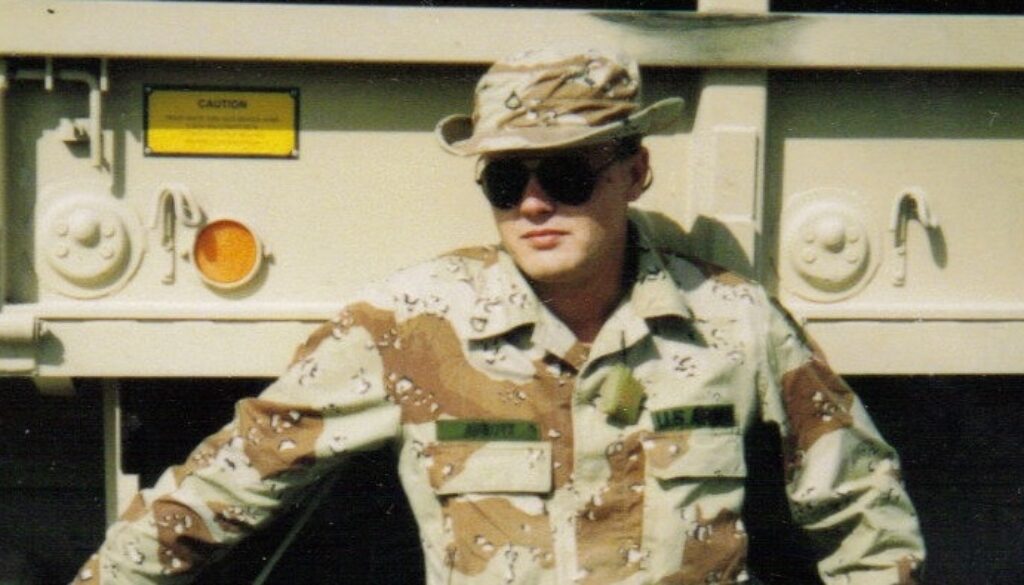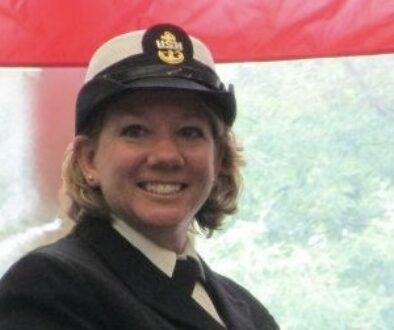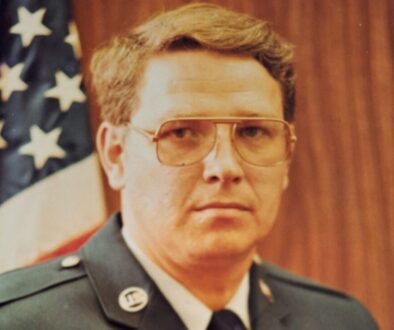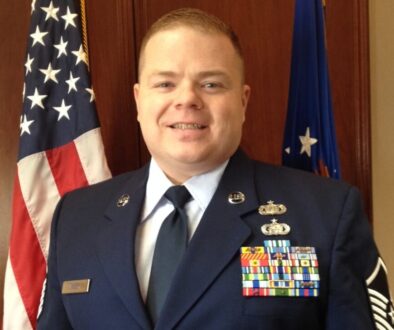Specialist Dale Abbott, U.S. Army – Serving in the National Guard: From Illinois to Desert Storm
Because National Guard units serve both the state and federal governments, members are often the face of the military most familiar to many Americans. When disaster strikes in a state, the governor calls upon the National Guard to respond. If our nation goes to war, the Guard’s citizen soldiers are expected to answer the call. Specialist Dale Abbott understands these state and federal roles all too well. He joined the Illinois Army National Guard and soon found himself driving a truck in Operation Desert Storm. After he returned, he helped people in flood-ravaged areas of southern Illinois. Both efforts were a far cry from his humble beginnings.
Dale was born in St. Louis in 1971 and raised in Effingham, Illinois. His biological father was never in the picture, and his biological mother could not handle the responsibility of raising a child, so both Dale and his older brother were adopted and raised by their maternal grandmother and her husband. In fact, Dale’s grandmother was the only mother he ever knew, and he called her and her husband mom and dad. Dale’s adoptive parents were also foster parents, fostering a total of forty-eight children over the years, so there were always lots of kids and their friends hanging out around the house. Since Dale’s dad worked for the railroad and travelled frequently, the bulk of the responsibility for all the kids fell to Dale’s mom, leaving the house in a state of controlled chaos twenty-four hours a day.
Dale attended public schools through the end of his sophomore year at Effingham High School, where he played football. He then transferred to Crossroads Christian Academy for his final two years, leaving football behind. To earn spending money, he delivered newspapers on a route he acquired when he was twelve. He also started working at a meat processing company when he was fifteen, helping skin and process deer and other meats during hunting season. Once he got his driver’s license, he began working for a landscaping company.
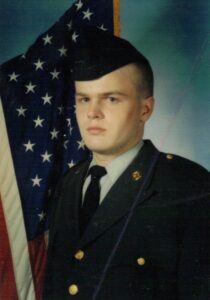
After Dale graduated from high school in 1989, he continued working for the landscaping company. He had no intention of making that a long-term career, though, because he already knew exactly what he wanted to do. He had befriended an old World War I veteran who lived on his street and loved to listen to his stories. He had also seen a flag that had been presented to his great-great-great-grandfather in recognition of his service during the Spanish American War. The result was Dale had patriotic blood flowing through his veins. Accordingly, Dale trekked to a recruiter in Effingham and enlisted in the Army National Guard’s 1544th Transportation Company, headquartered in Paris, Illinois, making him the first person to enlist in the military on his mother’s side of the family since his great-great-great grandfather. He planned on serving out his enlistment, attending college, and then joining the active-duty Army after he earned his degree.
In May 1990, Dale reported to the Military Entrance Processing Station (MEPS) in St. Louis, Missouri. He passed his final physical exam, took the oath of enlistment, and headed to Fort Dix, New Jersey, for basic training. Upon arrival, he was herded into a big room where drill instructors shouted orders telling the recruits where to go. Dale did not understand the instructions and feared he would be the first to be called given that his last name was Abbott. Miraculously, they called another recruit whose last name was Abbie, and when Abbie didn’t know where to go, the drill sergeants lit into him. Dale heard his name called next. He jumped up and took a seat next to Abbie, relieved he knew where to go. His relief was short-lived because the drill sergeants still found something to yell at him about anyway.
Although basic training challenged every recruit, Dale excelled. He was in the best shape of his life and was a particularly strong runner. He needed to improve at pushups, however, and that was where another recruit, Jeff Burris, came in. Jeff helped Dale improve his pushups, and, in return, Dale coached Jeff on his running. The two became best friends and together they worked through all the typical basic training hardships. Both graduated as privates after eight weeks, and they transitioned together directly into Advanced Individual Training (AIT), also at Fort Dix. There they learned to drive all kinds of Army vehicles, including Humvees, five-ton trucks, semis, and buses.
Dale and Jeff graduated from AIT in September 1990 with the job designation of motor transport operator. As Jeff had coincidentally enlisted in the same unit as Dale, they both reported for their first monthly drill weekend with the 1544th Transport Company in October just as military units around the country started to deploy to the Middle East as part of Operation Desert Shield. The goal of the operation was to deter further aggression by Iraq after it invaded Kuwait in August and to put U.S. and allied military units in position to liberate Kuwait when the time came. Within weeks of their first drill weekend, Dale and Jeff learned their unit would also deploy and join the U.S. war effort.
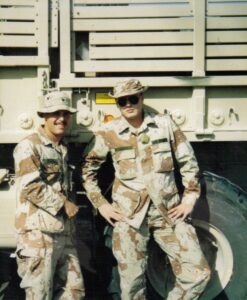
As Dale and Jeff were recent AIT graduates, they had the latest operational training in the unit, making them invaluable assets as the company prepared to deploy. Within weeks, everyone in the company moved by bus to Fort Campbell, Kentucky, where they received additional training and a battery of shots. Given the fear Iraq might employ chemical or biological weapons, they also practiced using special clothing and equipment—referred to as Mission-Oriented Protective Posture (MOPP) gear—designed to protect them from those types of weapons. In addition, Dale completed combat field medic training as well as advanced courses in tactical driving and dealing with chemical and biological weapon attacks.
The 1544th Transportation Company trained at Fort Campbell for a few weeks before loading onto Air Force transport aircraft and heading to Saudi Arabia. The unit arrived on November 6, 1990, and lived in a tent city while waiting for the unit’s vehicles to arrive. Once that happened, Dale and Jeff parted company, with Jeff and his platoon driving eighteen-wheel semis and Dale and his platoon driving the M939 six-wheeled heavy-duty truck, which could haul up to five tons of cargo in its bed.
Dale immediately began hauling people, equipment, engine parts, ammunition, food, water, and other supplies across the Saudi desert to wherever the cargo needed to go. Although he sometimes overnighted at places like King Khalid Military City or an abandoned cement factory near Damman dubbed “Cement City,” he made a point to spend as much time on the road as possible. If the unit needed a driver to haul something somewhere, Dale volunteered. As a result, he spent many nights sleeping in his truck.
By mid-January 1991, sufficient U.S. and allied forces were in place to begin the combat phase of their deployment, known as Operation Desert Storm. In anticipation of casualties, Dale drove doctors and nurses from a hospital unit into the Saudi desert to support the 1st Cavalry Division. That evening, as Dale sat in his truck with a nurse listening to “In the Air Tonight” by Phil Collins, they were notified that the air war had started. Accordingly, they were issued pills to hopefully deter the effects of any nuclear, biological, or chemical (NBC) weapons the Iraqis might use in a counterattack. That Phil Collins song has been etched in Dale’s mind ever since.
Dale and the other members of his platoon drove their five-ton trucks both on and off roads, often having to navigate their way across the pitch-black Saudi desert. With no readily observable waypoints, they often got lost and had to feel their way to their destinations in the dark. More than once, they drove into concertina wire surrounding a darkened allied camp. Dale twice had to cut his vehicle free from concertina wire and assisted his fellow drivers at least twenty times doing the same. Yet concertina wire around friendly camps was the least deadly of Dale’s concerns once the Iraqis started firing Scud ballistic missiles capable of carrying high explosives and chemical weapons at the allied forces massing for attack.
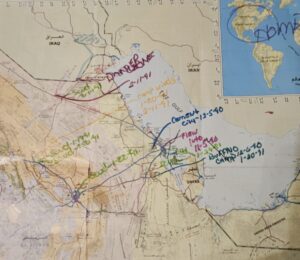
Dale endured six Scud attacks during his time in Saudi Arabia. The most memorable occurred after he and another soldier drove together with other trucks from Dale’s platoon to a Saudi port to pick up some cargo. During the drive to the port, the soldier saw a Bible Dale kept in the cab of his truck and asked if Dale was “one of those religious guys,” making it clear to Dale the soldier was not. A few hours later as they waited in the truck for the cargo to be loaded, sirens warned of an impending Scud attack. Dale and the other soldier got out of the truck, donned their MOPP gear, and anxiously waited to see what would happen. Moments later, a U.S. Patriot missile intercepted a Scud overhead, and shrapnel rained down on the platoon’s trucks. The soldier Dale was with quickly climbed back into the truck to avoid getting hit by the falling debris. When Dale joined him a few minutes later, he looked over at the soldier only to see him “reading the hell out of the Bible.” The other attacks Dale witnessed consisted of alarms followed by Patriot missiles intercepting the Scuds before they could do any harm. After surviving each one, Dale carved a notch in his truck’s steering wheel.
Once ground combat operations against Iraqi forces in Kuwait commenced on February 24, 1990, Dale’s transportation missions included hauling cargo across the desert to 1st Cavalry Division units in Kuwait. As a result, he was exposed to depleted uranium ammunition rounds and to toxic fumes from oil wells set on fire by retreating Iraqi units. Other toxins flowed from burn pits used to destroy waste, trash, and unexploded ordnance. At times, the smoke was so dense it looked like nighttime in the desert even though it was the middle of the day. Although this caused health problems for Dale later in his life, at the time, no one from 1544th Transportation Company sustained any combat-related injuries. One unit member—a soldier who had survived two tours of duty in Vietnam—did have to be evacuated after being bitten by a poisonous snake. He survived, although the bite made him very sick.
Snakes and Iraqi attacks weren’t the only dangers Dale and his fellow drivers had to contend with. In fact, one of the biggest dangers came from Saudi drivers, who were notoriously risky on the road. Dale witnessed this firsthand as his convoy drove down a two-lane highway. A Saudi driver tried to pass the convoy by veering into the oncoming traffic lane despite a large truck approaching him at high speed. The Saudi driver tried at the last moment to swerve back into the right lane, sideswiping one of the convoy’s five-ton trucks before being crushed by the truck in the oncoming lane. The Saudi driver—who was completely at fault in the accident—died on the scene. This was but one of the many accidents Dale saw involving local drivers. As proof in point, one of the roads leading into Kuwait was known as Dodge Road because Army drivers had to dodge all the abandoned wrecks involving Saudi and Kuwaiti civilian vehicles.
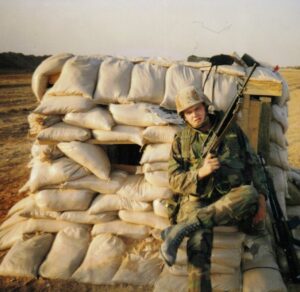
Desert Storm combat operations ended on February 28, 1991, and Dale and the rest of the 1544th Transportation Company returned to Paris, Illinois, in the months that followed, but not before Dale promoted to private first class. He then began drilling one weekend each month and two weeks out of each year as he originally envisioned at the time of his enlistment. What he did not envision was meeting the love of his life, Tammy Seeley, in a gas station near Effingham. They were married in June 1992 at just about the same time Dale started to become ill from the toxins he was exposed to during Operation Desert Storm.
Dale continued serving with the Illinois National Guard throughout 1992 and into 1993. In addition to promoting to specialist, he either trained or drove trucks during those drill periods, depending upon the unit’s needs. In the summer of 1993, the governor of Illinois called upon Dale and the rest of the 1544th Transportation Company to help fill sandbags in the southern part of the state to deal with extensive flooding. However, by the end of 1993, Dale’s Desert Storm illnesses, together with a freak accident he suffered while remodeling his house, signaled the end of his Army National Guard career. He received his honorable discharge at the end of his enlistment in August 1994 and focused on his full-time civilian career.
After an initial stint doing computer imaging for a landscaping company in Effingham, Dale moved with Tammy to Springfield, Illinois. There Dale began working as a general manager at a full-service car wash, a position he held for almost thirty years. He finally retired in 2023 and now devotes his free time to assisting veterans in any capacity he can. As part of that effort, he and his friend, Jeff Burris, are starting a podcast called Veteran Chow Line to facilitate veterans talking with each other about veterans’ issues.
Voices to Veterans is proud to salute Specialist Dale Abbott for his service in the Illinois Army National Guard. Not only did he serve the people of the great state of Illinois, but he also deployed as part of the victorious U.S.-led Desert Storm coalition, helping drive the invading Iraqi military out of Kuwait. Despite the illnesses he suffers due to his exposure to toxic substances during Desert Storm, he continues to devote his full energy to helping veterans today. For all he has done, and for all he continues to do, we wish him fair winds and following seas.
If you enjoyed Dale’s story, please sign up for the Voices to Veterans Spotlight monthly newsletter by clicking here. Once each month, you’ll receive a new written veteran’s story directly in your mailbox. Best of all, it’s free and you can unsubscribe at any time.


